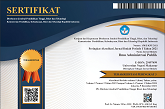Identification of the Doctrine of Violent Extremism of Terrorist Networks in De-Radicalization Efforts
(1) Master's Program in Strategic and Global Studies, University of Indonesia, Indonesia
(2) Master's Program in Strategic and Global Studies, University of Indonesia, Indonesia
(*) Corresponding Author
DOI: https://doi.org/10.26858/jiap.v13i1.49173
Abstract
Terrorists are not suddenly born, there is a process in which the process starts from radicalization, namely the transmission of radical ideology into a person. The radical understanding included is an ideology that is related to existing extremist ideology and is usually related to certain political groups or religious groups. The most important process in radicalization is in fact the process of giving doctrine to someone by a terrorist group. Once the Doctrine has been given, it becomes difficult to indoctrinate it. It requires a deep understanding of how doctrines are formed and how they are taught. This research describes how the extremist network of a former convict who is now active in deradicalization activities identifies extremist doctrines and ideologies. By understanding the process of identifying doctrines, it will be understood what processes can be carried out to dispel and fight these doctrines to carry out deradicalization. In this study, the case raised is the extremist network experienced by Agus Suprianto alias Farel, in his journey, he went through a process of accepting radical ideology up to extremist ideology, in the end he was deradicalized and is now in the Pancasila ideology which refers to national unity. The provisions are used to carry out empowerment activities and carry out deradicalization efforts.
Keywords
Full Text:
PDFReferences
Almazova, L. I. (2016). Radical islamic groups in contemporary Russia: State policy and inner processes in muslim communities. Oriental Studies. https://doi.org/10.22162/2075-7794-2016-26-4-201-215
Bruner, E. (2019). The kiss of Zira, Escher’s sphere, and the curse of the Ape-Man. Sistemi Intelligenti.
Creswell, J. W. (2014). A concise introduction to mixed methods research. SAGE publications.
Fujii, J., Homma, T., & Osaki, T. (2022). Superoxide Radicals in the Execution of Cell Death. In Antioxidants. https://doi.org/10.3390/antiox11030501
Gawda, B. (2022). The Differentiation of Narrative Styles in Individuals with High Psychopathic Deviate. Journal of Psycholinguistic Research. https://doi.org/10.1007/s10936-021-09824-w
Ghaemmaghami, A. (2017). Islamist terrorism in Europe: a history. Journal of Contemporary European Studies. https://doi.org/10.1080/14782804.2017.1258381
Hairgrove, F. P. (2011). Media use in conversion into Islamic radicalism: Why this person and not that person, why here, why now? In ProQuest Dissertations and Theses.
Hansen, S. J. (2021). IntoDarkness? Scrutinizing Economic Explanations for African Jihad. Current Trends in Islamist Ideology.
Harun, S., Avicenna, M., Mushoffa, E., & Atqa, M. (2011). The religious expression in indonesia: From orthodoxy of muslims to splinter and radicalism. In OIDA International Journal of Sustainable Development.
Khoir, T. (2015). Tujuh Karakter Fundamentalisme Islam. Al-Tahrir: Jurnal Pemikiran Islam. https://doi.org/10.21154/al-tahrir.v14i1.161
Kusari, K., & Walsh, C. A. (2021). A social pedagogy lens for social work practice with return migrants. International Journal of Social Pedagogy. https://doi.org/10.14324/111.444.ijsp.2021.v10.x.014
Landy, J. F., & Royzman, E. B. (2018). The moral myopia model: Why and how reasoning matters in moral judgment. In The New Reflectionism in Cognitive Psychology: Why Reason Matters. https://doi.org/10.4324/9781315460178
Mubarak, Z. (2012). Fenomena Terorisme di Indonesia: Kajian Aspek Teologi, Ideologi dan Gerakan. SALAM: Jurnal Studi Masyarakat Islam.
Mukhtar, S. (2016). Strategi Pemerintah Indonesia Menghadapi Terorisme Dalam Era Demokratisasi. Reformasi.
Muthuswamy, M. S. (2012a). A Sharia- and Jihad-based Theory of Muslim Radicalism. SSRN Electronic Journal. https://doi.org/10.2139/ssrn.1817784
Muthuswamy, M. S. (2012b). A Social Experiment in Muslim Radicalism: Contrasting Evolution of Pakistan and India. SSRN Electronic Journal. https://doi.org/10.2139/ssrn.1766243
Naumkin, V. (2003). Militant Islam in Central Asia: The Case of the Islamic Movement of Uzbekistan. Berkeley Program in Soviet and Post-Soviet Studies, Institute of Slavic, East European, and Eurasian Studies, UC Berkeley.
Neuman, W. L. (2014). Social Research Methods : Qualitative and Quantitative Approaches. Pearson Education Seventh Edition. In British Library Cataloguing in Publication Data.
Patton, G. W. (2021). Public Safety: Fighting Crime and Terrorism; Border Security (E. B. T.-E. of N. E. Greenspan (Ed.); pp. 528–536). Elsevier. https://doi.org/https://doi.org/10.1016/B978-0-12-409548-9.12332-2
Rooduijn, M., Burgoon, B., van Elsas, E. J., & van de Werfhorst, H. G. (2017). Radical distinction: Support for radical left and radical right parties in Europe. European Union Politics. https://doi.org/10.1177/1465116517718091
Syahputra, E., & Sukabdi, Z. A. (2021). Deradikalisasi Mantan Narapidana Terorisme: Studi Kasus Mw Alias Wg. Journal of Terrorism Studies, 3(2), 1–21. https://doi.org/10.7454/jts.v3i2.1036
Syauqillah, M., & Faton, M. Al. (2019). The transmission of global and regional extremism in Indonesia. Journal of Terrorism Studies, 1(1), 1–17.
Turner, G. J., & Pickvance, R. E. (2004). Social class differences in the expression of uncertainty in five-year-old children. In Class, Codes and Control: Volume II Applied Studies Towards a Sociology of Language. https://doi.org/10.4324/9780203008850-14
Article Metrics
Abstract view : 103 times | PDF view : 28 timesRefbacks
- There are currently no refbacks.
Copyright (c) 2023 Wahyu Agung Sukhamdani, Mohamad Ismed

This work is licensed under a Creative Commons Attribution 4.0 International License.
Diterbitkan oleh:
Program Studi Ilmu Administrasi Publik
Program Pascasarjana Universitas Negeri Makassar
JIAP Index By:

This work is licensed under a Creative Commons Attribution 4.0 International License.









